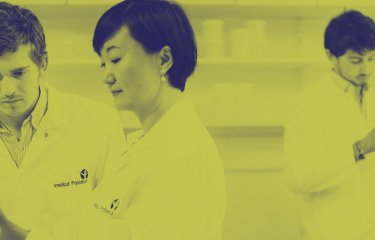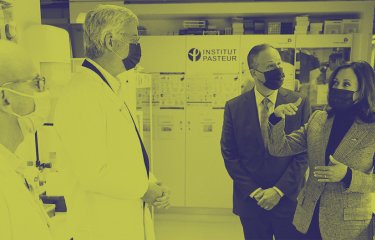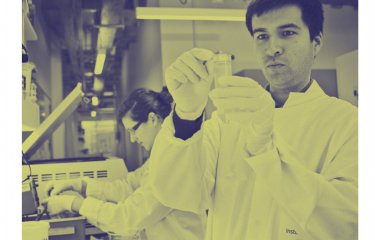Institut Pasteur Board of Governors Chairman Christian Vigouroux and President Prof. Sir Stewart Cole share their thoughts on the year's highlights. 2021 was a pivotal year poised between maintaining financial stability and supporting scientific projects.
What is your overall assessment of 2021?
Christian Vigouroux: The Board of Governors proved that the Institut Pasteur's historical structure served its purpose, showing determination, restraint and agility in forging relationships built on trust. We established an Ethics and Compliance Committee in addition to the Scientific Integrity Committee, which is now essential for supporting scientific activity. The Institut Pasteur has initiated compliance procedures for data (GDPR) and anti-corruption measures (Sapin II Law of 2016). Partnerships that commenced over two years ago are beginning to yield positive results. This has been the case with Université Paris Cité and also within the Pasteur Network. The Institut Pasteur is attractive, visited, read and respected. It is the Board of Governors' chief responsibility to ensure that this continues to be so.

Christian Vigouroux, Institut Pasteur Board of Governors Chairman
The Institut Pasteur is attractive, visited, read and respected. It is the Board of Governors' chief responsibility to ensure that this continues to be so.
Stewart Cole:
In addition to our strength as an institution, we have a string of scientific successes to our name. I would like to pay tribute to our efforts during the COVID-19 crisis. Our research has contributed significantly to the national and international response over the past two years. The CNR (National Research Center) for Respiratory Infection Viruses (in French) is conducting a considerable amount of work. I would also mention our fantastic achievements in pathogenesis, long COVID, and diagnostic, vaccine and therapeutic strategies for all variants. Our modeling work (in French) has provided vital information for monitoring the outbreak and for guiding decisions. We have also identified and characterized a SARS-CoV-2-neutralizing monoclonal antibody which is effective against Omicron, and fast-track preclinical development is currently underway through our startup SpikImm.
In an increasingly competitive scientific environment, we are consolidating our national and international standing.

Stewart Cole, Institut Pasteur director general
Is it true that these successes have not affected the balance of expenditure?
CV: Achieving balance is a must for a private foundation with charitable status such as ours. According to the Board of Governors, which is responsible for overall balance, the President and his team have progressed towards developing a balanced budget for the Institut Pasteur in a challenging climate. The current recovery is in line with the target of the 2019-2023 Strategic Plan. Balance holds the key to future breakthroughs in scientific research.
Which scientific objectives were achieved in 2021?
SC: We hired five new committed and talented 5-year group leaders. In an increasingly competitive scientific environment, we are consolidating our national and international standing. Our reputation is now more beneficial than ever, as demonstrated by the visit of US Vice President Kamala Harris, and should help boost international philanthropy. The new governance of the Pasteur Network has contributed to this standing, as has the Institut Pasteur's enhanced position in the research ecosystem through the historic agreement signed with Université Paris Cité. That's without mentioning our partnerships with the French Research Agency on HIV and Emerging Infectious Diseases (ANRS-MIE), the CNRS, Inserm and the Paris Public Hospital Network (AP-HP). I hope links with the Crick, Oxford and UCSF will be next on the list for us.
Within this ecosystem, what are the Board of Governors' key concerns?
CV: We are ambitious and alert to the Institut Pasteur's position in the new scientific landscape and in terms of recruiting the best and brightest scientists. And of course access to funding and programs (e.g. in infectious diseases) is a primary concern. Our institute also needs to be mindful of its ability to change and bounce back, or even redefine its contribution to vaccine research. Let us not forget that our private status enables rapid redeployment where necessary. Lastly, the Board keeps a constant eye on public donations and the strength of our position in terms of contracts and grants.
A word about the future?
SC: We won the EU HR Excellence in Research award in 2021 in recognition of our recruitment policy and working environment. We aim to continue offering the best possible research and teaching conditions to ensure we can attract and train young scientists, and pledge to take action to improve female representation in senior scientific roles. On a scientific level, lessons have been learned from the health crisis. In my view, climate change and its impact on future emerging diseases is of critical importance.
CV: In future years, it's important for the Institut Pasteur both to maintain its bold and inquisitive outlook with no other limits than its capacities at any given time, and also to change its methods, partnerships and programs whenever improvements are within reach. Pasteur is never more Pasteur than when it embarks on new scientific projects. As regards governance, October 2022 will see the election of a new Board Chairman, and in late 2023 the Search Committee will submit its proposals for a new President. Beyond the people representing it, the Institut Pasteur will remain one of the best conceivable organizations for universal science.

Christian Vigouroux, Institut Pasteur Board of Governors Chairman
October 2022 will see the election of a new Board Chairman, and in late 2023 the Search Committee will submit its proposals for a new President.
What is your scientific vision for the next decade?
SC: I aim to set a clear and ambitious course for the Institut Pasteur beyond 2023, which marks the conclusion of the current Strategic Plan and also, incidentally, the conclusion of my own term as President. I mentioned the issue of climate change and future emerging diseases. There are key challenges compelling us to increase and renew our surveillance efforts and review our strategy in preparation for future pandemics. I believe this issue to be one of the main challenges for the future of the Institut Pasteur in the years leading up to 2030.
The issue of climate change and future emerging diseases are key challenges compelling us to increase and renew our surveillance efforts and review our strategy in preparation for future pandemics.

Stewart Cole, Institut Pasteur director general
This issue of tackling emerging diseases chimes well with the Institut Pasteur's traditional expertise. Would you agree that it resonates with Louis Pasteur's work and the bicentenary of his birth in 2022?
CV: The bicentenary is an opportunity for each of us to channel the "Pasteurian spirit" and thus remain united, inventive and outward-looking. Our role is to benefit world health by discovering processes that threaten it and making every effort to gain the public's trust. Preventing and tackling future pandemics is an eminently "Pasteurian" objective. Beyond all the fine words, the bicentenary celebrations should be an ode to the future, to risk and invention, and looking ahead to where we're either not or no longer expected to be. I also hope that the Institut Pasteur will contribute, and, where possible, initiate debates and decisions on research in France and Europe.
SC: As our Board Chairman says, the "Pasteurian spirit" continues to drive and inspire the people who work here in Paris and throughout the Pasteur Network. As well as being our institute's founder, Louis Pasteur was the pioneer of an approach to research focused on better understanding the living world, improving human health, and passing on this approach and these values to future generations. This mindset will help us tackle major future scientific challenges. The bicentenary is about more than just celebrating our achievements; it is an opportunity to consider our future.
So how do we prepare for other future scientific challenges?
SC: We will start instigating internal discussions. In 2022, I am launching a process of collective reflection, dialog and outward focus aimed at contemplating the Institut Pasteur's future development.
This collaborative process will be based on consultation. Staff in scientific and support roles will be asked to share experiences and ideas, with input from professionals. Our younger staff will play a key role in this process.
So Louis Pasteur's values continue to drive the institute.
CV : We want the Institut Pasteur to produce the best science through perseverance – a value cherished by Louis Pasteur – and I'd almost say relentlessness. We want it to further increase its outward focus on the world: the Institut Pasteur receives numerous requests for cooperation, both with the Institut Pasteur in Paris and the Pasteur Network, which is a telling sign. Finally, we want the Institut Pasteur to continue attracting both early and mid-career scientists. Our aim is to meet the challenge presented by Georges Simenon in his 1931 novel Pietr the Latvian which evokes the figure of a researcher without purpose. Why do research, why study? "Studying for its own sake like that Belgian university professor who spoke all the far-eastern dialects (there are around forty of them), but had never set foot in Asia, nor even taken any interest in the people whose language he dabbled in dissecting." Such an attitude is contrary to the whole Pasteurian spirit: we never dabble; our research always strives to uphold our values, benefit human health and improve people's futures. Our focus is on the Institut Pasteur, both present and above all future. The decisions we make today concern the Institut Pasteur of the 2030s and beyond.






